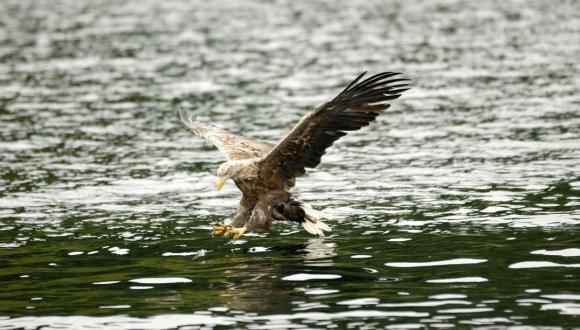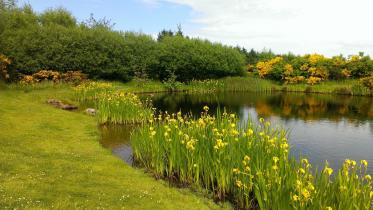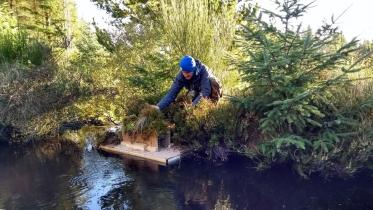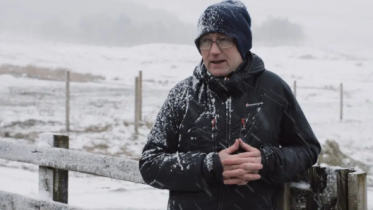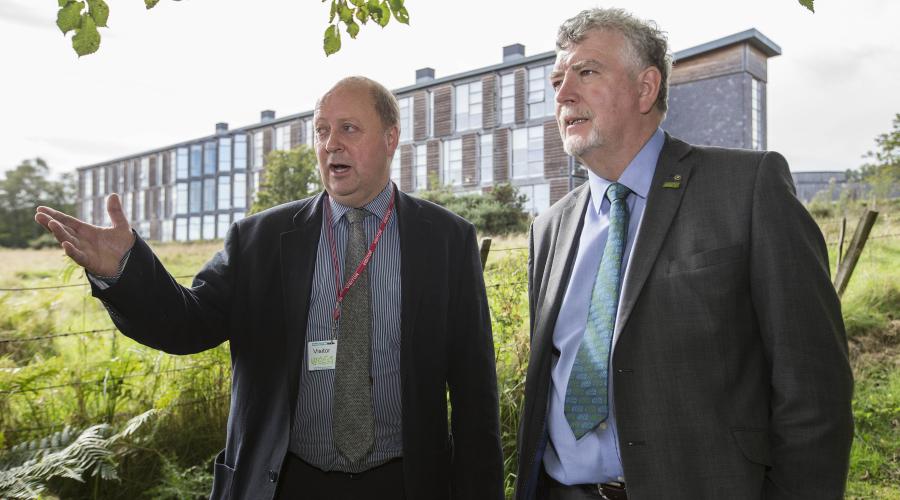
New accord between NatureScot and Farmers' Union promises action on sea eagles
26 September 2014
A new joint statement of intent on balancing the needs of sheep farmers and crofters with the conservation of sea eagles has been announced by NatureScot and NFU Scotland.
The declaration was signed by NatureScot chairman Ian Ross and NFU Scotland president Nigel Miller at Great Glen House, NatureScot’s Inverness headquarters.
Under the terms of the agreement, NatureScot recognises that sea eagle predation on live lambs occurs. This was noted by a previous study on Mull.
However, this and another study found no evidence of widespread significant predation on live lambs, and concluded that most lambs found in eagle nests were taken as carrion. Examination of some nests has frequently revealed remains of dead lambs, and NatureScot accepts some of these would have been taken when live.
NFU Scotland recognises the importance of sea eagles as part of Scotland’s biodiversity and is committed to working with NatureScot and others in finding ways of reducing any impacts of sea eagles on farming and crofting interests.
Both organisations are committed to balancing conservation with farming in ways which benefit the biodiversity, economic and social interests of Scotland. This will be taken forward through the Sea Eagle Scheme Steering Panel and new local stakeholder groups.
The moves come after a survey of NFU Scotland members’ views and experiences of sea eagles, and the publication in early 2014 by NFU Scotland of ‘Sea eagles and sheep farming – an action plan for sustainable co-existence’.
The agreement will see a new Sea Eagle Management Scheme in place by spring 2015, subject to funding approval by NatureScot and Scottish Government. This will use experienced and trusted rapid response contractors to respond at once to farmers’ and crofters’ concerns about any sea eagle impacts on their flocks, and advise them on options to mitigate these impacts. It will also assist those hardest hit to make positive management changes.
Local stakeholder groups covering the main sea eagle areas are expected to be set up by November 2014. These will initially cover Mull/North Argyll/Lochaber; Skye/Lochalsh; and Gairloch/Wester Ross.
A Sea Eagle Action Plan will also be published by September 2016 and implemented by March 2017.
The Sea Eagle Scheme Steering Panel will collate, analyse and act on feedback during spring on sea eagle impacts and responses to management measures. This panel will develop proposals for sheep, sea eagle and habitat management measures
The panel will collate, analyse and act on feedback during spring on sea eagle impacts and responses to management measures. Representatives will be invited to sit on the panel which comprises NFU Scotland, NatureScot, SCF, RSPB and the Scottish Government.
Environment and Climate Change Minister Paul Wheelhouse said: “Sea eagles are a magnificent species of bird and are a valuable part of our Scotland’s biodiversity and we know, from the economic impact on Mull, that sea eagles can have a an important part to play in our economy. However, we also recognise that there have been concerns in some farming quarters that they are having an effect on lamb production.
“I met with the NFU Scotland on Mull last year to discuss the issue about the impact sea eagles are having on farms, and I warmly welcome NatureScot and the NFUS working together to find ways of minimising any adverse impacts on livestock and supporting agricultural production which also making the most of the wider economic gains from sea eagles now established in Scotland.”
NFUS president Nigel Miller said: “Today’s agreement with NatureScot is a lot more than a commitment of two organisations to collaborate; it is a significant milestone towards understanding and managing Scotland’s sea eagle population. The joint plan will be driven through regional groups involving farmers and crofters, and has a clear timetable.
“To secure vital progress, the partnership must ensure that the process is inclusive and takes account of farmers’ and crofters’ views and experiences. Collaboration will provide the foundations for a programme that minimises lamb losses and safeguards sheep flocks whilst also underpinning a sustainable sea eagle population.”
Ian Ross, the NatureScot chairman, said: “We recognise there are some concerns over the impact of sea eagles, but we are committed to working closely with NFU Scotland and its members to help tackle these challenges.
“This joint statement we have agreed reflects the close collaborative working between us and NFU Scotland. It acknowledges the willingness on both sides to promote better mutual understanding and seek ways of working more effectively together.
“It is also important to recognise the economic benefits that sea eagles bring to tourism, particularly to rural areas, while acknowledging that in some cases, sea eagles have taken live lambs. We are working closely with farmers and crofters to minimise the conflict between the birds and their impact on livestock.”
